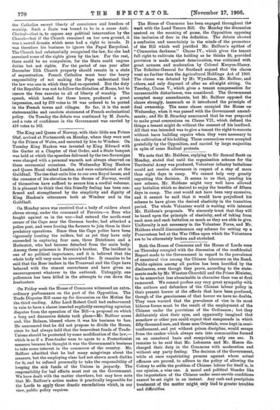On Friday week the House of Commons witnessed an extra-
ordinary performance on the part of the Opposition. The Trade Disputes Bill came up for discussion on the Motion for the third reading. After Lord Robert Cecil had endeavoured in vain to have a clause inserted explicitly exempting agrarian disputes from the operation of the Bill—a proposal on which a long and discursive debate took place—Mr. Balfour arose and, like Balsam, blessed where it was his business to ban. He announced that be did not propose to divide the House, since he had always held that the benevolent funds of Trade- Unions should be protected by some modification of the law,— which is as if a Free-trader were to agree to a Protectionist measure because he thought it was the Government's business to take some interest in the commerce of the country. Mr. Balfour admitted that he had many misgivings about the measure, but the employing class had not shown much dislike for it, and he refused personally to take the responsibility of keeping the sick funds of the Unions in jeopardy. The responsibility for bad effects must rest on the Government. We have dealt with the matter elsewhere, but may here note that Mr. Balfour's action makes it practically impossible for the Lords to apply those drastic emendations which, in our view, public policy requires.


























































 Previous page
Previous page